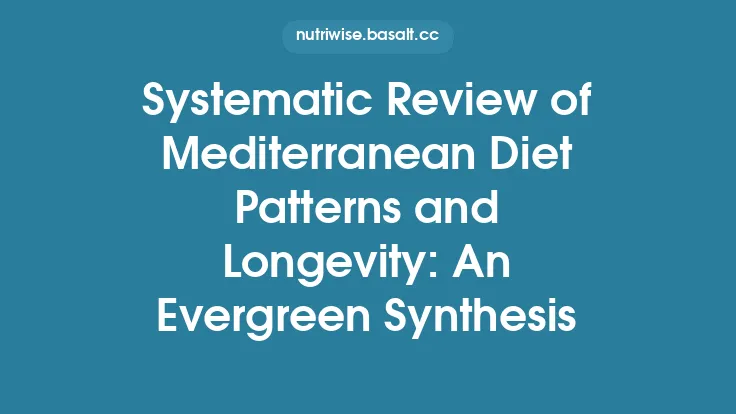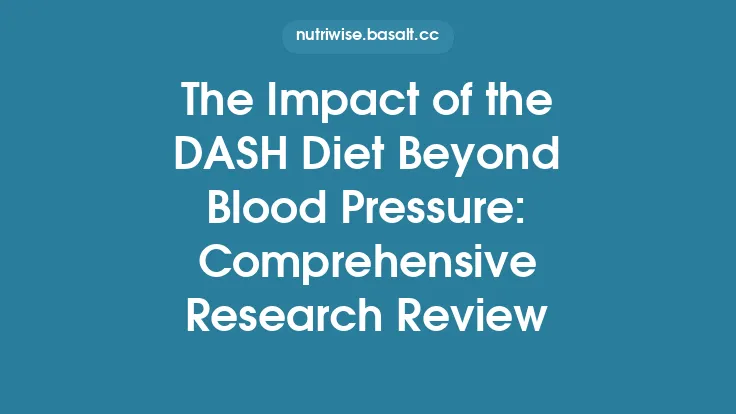The Mediterranean diet, rooted in the traditional eating patterns of countries bordering the Mediterranean Sea, has become one of the most extensively studied dietary patterns in modern nutrition science. Its appeal lies not only in its flavorful, diverse cuisine but also in a robust body of evidence linking it to a wide range of health benefits—from cardiovascular protection to cognitive resilience. This review synthesizes the current scientific literature, highlighting the diet’s core components, the biological mechanisms that underlie its effects, and the quality of evidence supporting its role in disease prevention and health promotion.
Core Components and Nutritional Profile
The Mediterranean dietary pattern is characterized by a high intake of:
- Extra‑virgin olive oil as the principal source of added fat, providing monounsaturated fatty acids (MUFA) and phenolic compounds.
- Plant‑based foods such as fruits, vegetables, legumes, nuts, seeds, and whole grains, delivering fiber, vitamins, minerals, and phytochemicals.
- Fish and seafood consumed at least twice weekly, supplying long‑chain omega‑3 polyunsaturated fatty acids (EPA/DHA).
- Moderate dairy (primarily cheese and yogurt) and moderate wine (mainly red) with meals.
- Limited red meat and processed foods, with sweets and refined grains reserved for occasional consumption.
These components collectively create a nutrient-dense, low‑energy‑density diet rich in antioxidants, anti‑inflammatory compounds, and favorable fatty acid ratios (high MUFA/PUFA, low saturated fat).
Epidemiological Evidence
Large prospective cohort studies have consistently demonstrated associations between higher adherence to the Mediterranean diet and reduced risk of chronic diseases:
- Cardiovascular disease (CVD): The seminal PREDIMED trial (Prevención con Dieta Mediterránea) showed a 30% relative risk reduction in major cardiovascular events among participants assigned to a Mediterranean diet supplemented with extra‑virgin olive oil or nuts compared with a low‑fat control diet (Estruch et al., 2013, *NEJM*). Subsequent meta‑analyses of cohort studies confirm a dose‑response relationship, with each 2‑point increase in Mediterranean diet score linked to a ~10% lower CVD risk.
- Type 2 diabetes: Observational data indicate a 20–25% lower incidence of diabetes in high‑adherence groups, mediated partly by improved insulin sensitivity and glycemic control (Schwingshackl & Hoffmann, 2014, *BMJ*).
- Cancer: While evidence is more heterogeneous, higher Mediterranean diet scores correlate with modest reductions in incidence of colorectal, breast, and prostate cancers, likely reflecting the diet’s high fiber, antioxidant, and anti‑inflammatory content.
- Neurodegeneration: Longitudinal studies report slower cognitive decline and lower risk of Alzheimer’s disease among Mediterranean diet adherents, with mechanisms involving reduced oxidative stress and vascular health.
Randomized Controlled Trials (RCTs) and Intervention Studies
Beyond observational data, several well‑designed RCTs provide causal insight:
- PREDIMED (Primary Prevention): Over a median follow‑up of 4.8 years, participants receiving a Mediterranean diet plus extra‑virgin olive oil experienced a 31% reduction in the composite endpoint of myocardial infarction, stroke, or cardiovascular death (HR = 0.69; 95% CI 0.54–0.89). A sub‑analysis demonstrated significant improvements in endothelial function and reductions in inflammatory biomarkers (IL‑6, CRP).
- PREDIMED‑Plus (Weight‑Loss Focus): This trial combined a Mediterranean diet with energy restriction and physical activity, showing greater weight loss, improved lipid profiles, and reduced hepatic steatosis compared with standard care after 12 months.
- Mediterranean Diet and Cognitive Function (MIND‑Mediterranean Hybrid): A 3‑year RCT in older adults reported that participants following a Mediterranean‑style diet enriched with berries and leafy greens exhibited a 2‑point higher score on the global cognition composite than controls (p < 0.01).
- Metabolic Syndrome Outcomes: Multiple short‑term trials (6–12 months) have documented reductions in waist circumference, systolic/diastolic blood pressure, fasting glucose, and triglycerides among participants adhering to a Mediterranean diet, supporting its role in metabolic syndrome mitigation.
Biological Mechanisms
The health benefits of the Mediterranean diet arise from synergistic actions across several physiological pathways:
- Lipid Modulation: MUFA from olive oil favorably alters lipoprotein particle size, increasing HDL‑C and reducing LDL‑C oxidation. Omega‑3 fatty acids from fish attenuate triglyceride synthesis and exert anti‑arrhythmic effects.
- Anti‑Inflammatory Effects: Polyphenols (hydroxytyrosol, oleocanthal) and flavonoids (quercetin, luteolin) inhibit NF‑κB signaling, lowering systemic inflammation markers (CRP, TNF‑α). The diet’s high fiber content also promotes short‑chain fatty acid (SCFA) production, which modulates immune responses.
- Oxidative Stress Reduction: Antioxidants (vitamin C, E, carotenoids, polyphenols) scavenge reactive oxygen species, protecting endothelial cells and neuronal tissue from oxidative damage.
- Gut Microbiota Modulation: A fiber‑rich, polyphenol‑laden diet fosters a diverse microbiome, increasing beneficial taxa (Bifidobacterium, Lactobacillus) and SCFA producers. This microbiota shift improves gut barrier integrity and metabolic endotoxemia.
- Endothelial Function and Vascular Health: Olive oil polyphenols enhance nitric oxide bioavailability, improving vasodilation. The diet’s low sodium and high potassium content further support blood pressure regulation.
- Epigenetic Influences: Nutrients such as folate, vitamin B12, and polyphenols can modify DNA methylation patterns linked to cardiometabolic gene expression, suggesting a role in long‑term disease risk programming.
Nutrient Interactions and Food Synergy
A distinctive feature of the Mediterranean diet is the emphasis on whole foods and culinary practices that preserve nutrient integrity:
- Cooking Methods: Light sautéing in olive oil retains heat‑stable polyphenols while enhancing the bioavailability of fat‑soluble vitamins (A, D, E, K) from vegetables.
- Food Pairings: Combining tomatoes (rich in lycopene) with olive oil increases lycopene absorption due to the lipid matrix. Similarly, nuts paired with fruit provide complementary micronutrients and healthy fats.
- Moderate Alcohol: Red wine, consumed in moderation (≤1 glass/day for women, ≤2 for men), contributes resveratrol and other stilbenes, which have been linked to endothelial protection. However, the benefits are contingent on low overall alcohol intake and are not a recommendation for non‑drinkers.
Quality of Evidence and Limitations
While the Mediterranean diet enjoys a strong evidence base, critical appraisal is essential:
- Study Design Heterogeneity: Cohort studies vary in diet assessment tools (food frequency questionnaires vs. 24‑hour recalls), potentially introducing measurement error.
- Adherence Metrics: Scoring systems (e.g., Mediterranean Diet Score, Trichopoulou index) differ in component weighting, affecting comparability across studies.
- Population Specificity: Most large RCTs have been conducted in Mediterranean or European populations; extrapolation to non‑Mediterranean ethnic groups requires caution, though emerging data from North American and Asian cohorts suggest similar benefits.
- Confounding Lifestyle Factors: Physical activity, socioeconomic status, and healthcare access often co‑vary with diet adherence, complicating causal inference despite statistical adjustments.
- Long‑Term Sustainability: While short‑ to medium‑term trials demonstrate efficacy, data on adherence beyond 5–10 years are limited. Behavioral interventions and culturally adapted recipes are pivotal for sustained implementation.
Practical Recommendations for Implementation
Translating evidence into everyday practice involves actionable steps:
- Base Meals on Plant Foods: Aim for at least half of each plate to consist of vegetables, legumes, or whole grains.
- Prioritize Olive Oil: Use extra‑virgin olive oil as the primary cooking fat and for dressings; limit butter and other saturated fats.
- Incorporate Fish Regularly: Target two servings per week of fatty fish (e.g., salmon, sardines, mackerel) to secure omega‑3 intake.
- Choose Nuts and Seeds Wisely: A modest daily portion (≈30 g) of unsalted nuts provides healthy fats and protein.
- Moderate Dairy and Wine: Opt for low‑fat cheese and yogurt; if alcohol is consumed, limit to ≤1–2 glasses of red wine per day with meals.
- Limit Red and Processed Meats: Reserve these for occasional consumption, focusing instead on poultry or plant protein sources.
- Emphasize Whole Grains: Replace refined grains with whole‑grain alternatives (e.g., barley, farro, whole‑wheat pasta).
Future Research Directions
To refine our understanding and broaden applicability, several research avenues merit attention:
- Precision Nutrition: Investigate how genetic polymorphisms (e.g., APOE, FTO) modulate individual responses to the Mediterranean diet.
- Microbiome‑Diet Interactions: Longitudinal metagenomic studies to delineate causal pathways linking diet‑induced microbiota changes to metabolic outcomes.
- Life‑Course Studies: Examine the impact of early‑life exposure to Mediterranean dietary patterns on lifelong disease risk.
- Implementation Science: Develop and test culturally tailored interventions that maintain diet fidelity while respecting regional food preferences.
Conclusion
The Mediterranean diet stands out as a scientifically validated, nutritionally balanced eating pattern that confers protection against a spectrum of chronic diseases. Its benefits arise from a harmonious blend of healthy fats, abundant plant foods, moderate fish intake, and lifestyle factors that together modulate inflammation, oxidative stress, lipid metabolism, and gut microbiota. While methodological challenges persist, the convergence of epidemiological data, randomized trials, and mechanistic research provides a compelling case for its adoption as a cornerstone of public health nutrition. By embracing the diet’s core principles and adapting them to diverse cultural contexts, individuals and healthcare systems can leverage this evidence‑based approach to promote sustainable, long‑term health.





